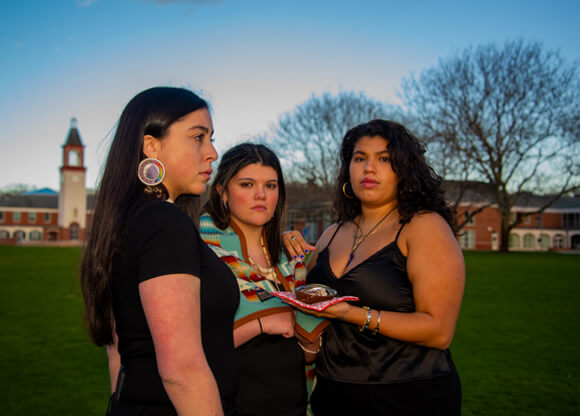Native American Heritage Resources
Learn more about indigenous culture and Native American heritage.


Inclusive Excellence Celebrations

Inclusive Excellence Celebrations
Hosted by our Indigenous Student Union, the Indigeneity Initiative, the Office of Inclusive Excellence and the Albert Schweitzer Institute, “Dancing in the Shadow of Sleeping Giant,” Quinnipiac's inaugural Intertribal Powwow, presented the Quinnipiac community with the opportunity to celebrate Indigenous culture and traditions.
All events were free and open to the public. These events were supported by funding through CT Humanities.
Join us for a thoughtful dialogue and reflection on how the powwow fits within broader efforts to reimagine higher education through Indigenous epistemologies led by endawnis Spears from the Akomawt Educational Initiative. Please bring your lunch, light snacks will be provided. This event is free and open to the public. Registration is required.
The exhibition explores the remarkable generosity of the Choctaws and Cherokees, who themselves had endured forced displacement only years earlier, as well as the Anishinaabe, Haudenosaunee and Huron-Wendat Indigenous Peoples in Canada West, whose donations came at a time of increasing settler encroachment and broken treaties. This event offered a rare opportunity to reflect on a profound moment of historical solidarity and generosity between Indigenous communities and the Irish people, ensuring that these acts of kindness continue to be honored and remembered.
The exhibition includes:
Original government reports outlining treaty agreements from the 1830s
Historic maps of Ireland and the Trail of Tears
A sculpture honoring the Choctaw gift
Artwork by Philip Cote
A Wampum Belt, presented by the Haudenosaunee Nationals (formerly Iroquois Nationals) to Ireland Lacrosse in 2022, symbolizing the ongoing Circle of Giving
Participants learned about the history of the modern day intertribal powwow and how it showed up in the Northeast. Led by Chris Newell and endawnis Spears from the Akomawt Educational Initiative, this discussion also considered the role of the powwow in the context of the university and its connections to cultural reclamation and sovereignty. This event was free and open to the public.
Chris Newell and endawnis Spears from the Akomawt Educational Initiative led participants through the U.S. version of the KAIROS Blanket Exercise. The KAIROS Blanket Exercise program is a unique, interactive and participatory history lesson developed in collaboration with Indigenous Elders, knowledge keepers and educators. The Blanket Exercise covered more than 500 years in a 90-minute experiential workshop that aimed to foster understanding about our shared history as Indigenous and non-Indigenous peoples.
To help acknowledge and respect indigenous people and their land, Quinnipiac University welcomed Mohegan Tribe Vice Chairperson Sarah E. Harris to speak with the university community.
Harris’ talk, “We’re All Part of This Story,” was hosted by the Office of Inclusive Excellence for Quinnipiac’s ongoing Critical Conversation Speaker Series. Her discussion focused on indigenous communities, people’s rights and how the Mohegan Tribe works with external communities and institutions. Harris also shared a fireside chat with Jennifer Rawlings, JD ’15, tribal affairs director for the Center for Indigenous Peoples Rights, and answered questions from the audience.
An educational workshop led by Kiara Tanta-Quidgeon, an eastern blanket dancer, brought together the arts, cultural awareness and history of powwow dancing. Dinner was provided, and there was also an opportunity to win Indigenous-made jewelry and other prizes.
Learn more about indigenous culture and Native American heritage.